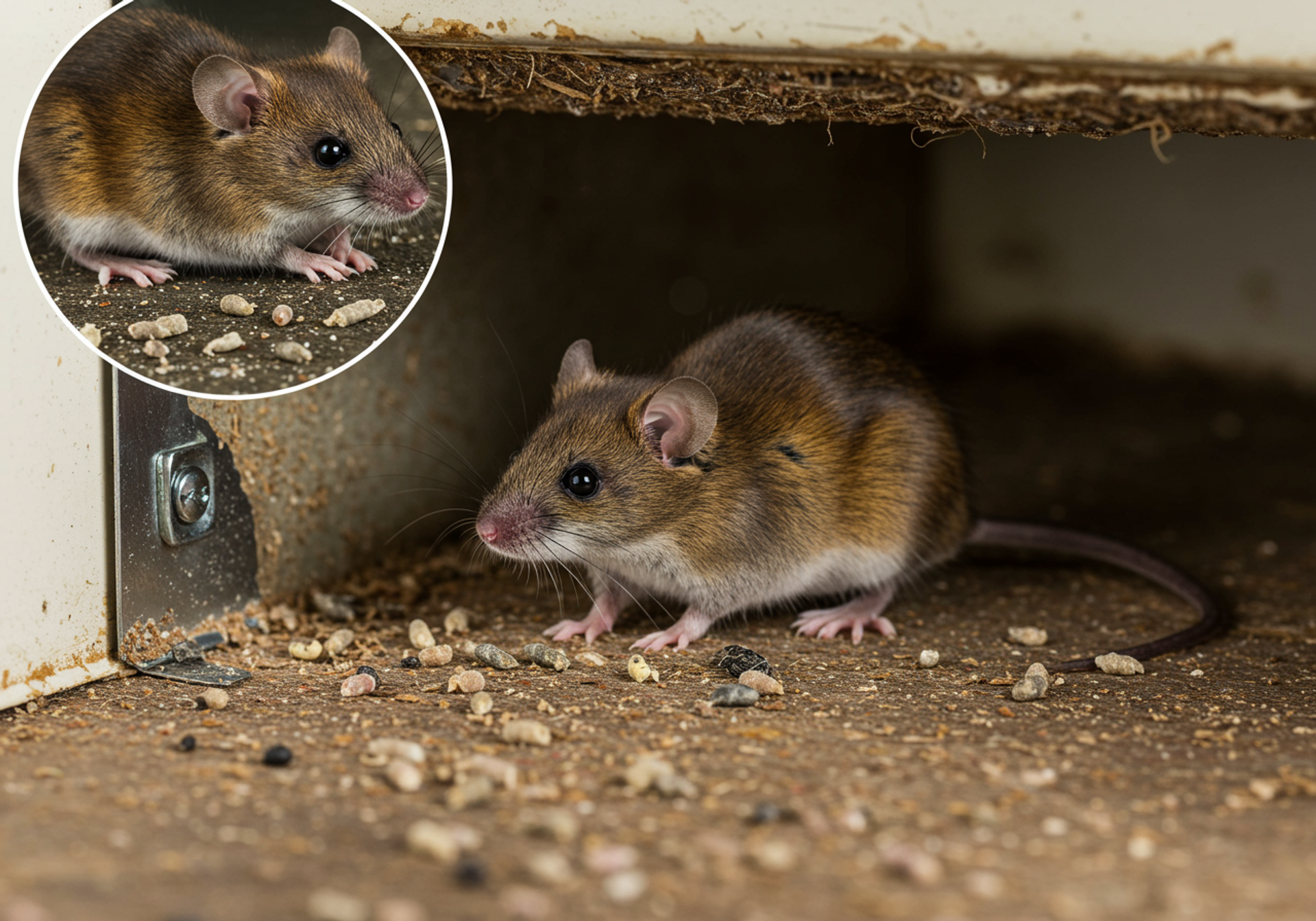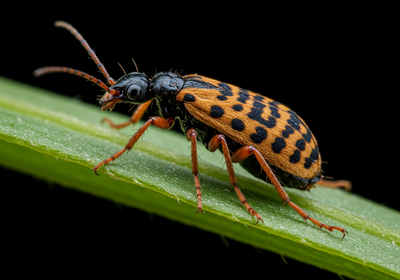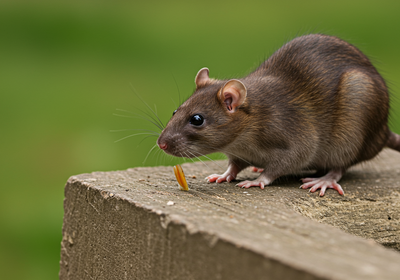
Expert Rodent Extermination NJ: Comprehensive Rat & Mouse Control for Your Home & Business
Facing unwanted guests like rats or mice in your New Jersey home or business? Unseen rodent infestations can cause significant damage and serious health risks, particularly in vulnerable areas like Ocean and Monmouth Counties. Resolve Pest Management offers professional, humane, and effective rodent extermination services. Explore our comprehensive guide to understanding rodent problems, expert removal techniques, costs, and proven prevention strategies. Learn why we are the premier local choice for a truly pest-free environment and reclaim your peace of mind today!
Expert Rodent Extermination Services in New Jersey: Comprehensive Rat and Mouse Control
Unwanted guests like rats and mice can turn your comfortable New Jersey home or bustling business into a source of stress. These hidden invaders don't just nibble on food; they can cause serious damage, pose real health risks, and disrupt your peace of mind. This is especially true in places like Ocean and Monmouth Counties, where our beautiful coastal areas and lively suburban neighborhoods offer plenty of hiding spots and food sources for rodents.
At Resolve Pest Management, we understand these local challenges. We offer professional rodent control methods designed to get rid of pests and keep them away for good. Our approach includes detailed inspections, precise extermination, effective ways to seal up your property, and ongoing check-ups. This guide will walk you through how to spot a rodent problem, explore the best ways to get rid of them, explain service costs, show you why Resolve Pest Management is the top local choice, and share proven tips to keep your property rodent-free. Whether you're finding chewed wires in your garage or droppings in your restaurant, our expert plan will give you the confidence to reclaim your space.
How to Spot a Mouse or Rat Infestation in Your New Jersey Property
A rodent infestation means mice or rats have made themselves at home, nesting, finding food, and hiding in your walls and other spaces. You'll often notice droppings, gnaw marks, and unusual noises. Catching these signs early is super important to prevent major property damage and reduce the risk of sickness. Knowing what to look for and how rodents behave is key to acting fast. Below, we'll detail the clear signs of both mouse and rat activity in homes and businesses.
What Are the Common Signs of Mouse Infestation?
Mice leave behind small, tapered droppings, usually about the size of a grain of rice (3–6 mm long). You'll often find these in kitchen cabinets, behind appliances, and along the edges of your floors. You might also hear faint scratching or scurrying sounds, especially at night when these nocturnal pests are most active. They can leave oily fur marks along their travel paths, particularly near food sources. Spotting these subtle clues early can help you protect your stored food and take quick action.
How Can You Recognize Rat Infestation Symptoms?
Rats produce larger, capsule-shaped droppings, up to 20 mm long, which you might find near trash cans, in utility rooms, and around outside vents. Their gnaw marks are wider and can damage important things like wooden structures or electrical wiring. You might hear louder thumping or squealing noises in attics and crawl spaces after dark. Like mice, they also leave grease marks from their fur, which often darken along their regular routes. Catching these symptoms quickly helps prevent serious issues like fire hazards and significant structural damage.
What Damage Do Rodents Cause to Homes and Businesses?
Rodents cause a surprising amount of harm. They chew through insulation and wiring, which can lead to costly electrical fires. They shred paper, cardboard, and duct sealant, compromising the integrity of your walls and heating systems. Both mice and rats gnaw on pipes, wooden beams, and air ducts, leading to expensive repairs and higher energy bills. In businesses, especially those handling food, contamination can lead to health code violations and harm your reputation. Preventing such destruction starts with recognizing the damage patterns and calling in professionals right away.
How Do Rodent Behaviors Differ Between Mice and Rats?
Mice are naturally curious and tend to nest close to their food, often creating many small entry points under doors or through tiny wall cracks. Rats, on the other hand, are more cautious. They prefer larger nesting areas like basements or crawl spaces and can squeeze through structural gaps larger than half an inch (12 mm). Mouse populations can grow very quickly, while rats reproduce more slowly but tend to roam over wider areas for food. Understanding these differences helps us plan our inspections and sealing efforts more effectively to prevent future problems.
What Are the Most Effective Professional Mouse and Rat Extermination Methods?
Expert rodent control isn't just about setting a few traps; it's a complete approach that includes inspection, a tailored treatment plan, sealing entry points (exclusion), and improving cleanliness for long-lasting results. Professional exterminators carefully map out where rodents are active, strategically place traps and baits, seal off ways they can get in, and suggest ways to keep your property cleaner. This layered strategy works much better than just one method because it tackles existing rodents and stops new ones from moving in. Let's look at each key part of a full extermination plan.
How Does the Rodent Control Process Work: Inspection to Extermination?
Our thorough process starts with an inspection, where our technicians look for weaknesses in your property – gaps in foundations, openings in walls, and roof vents – and identify any droppings or nests. Then, we strategically place traps and bait stations where rodents are most active. Once we confirm the rodents are gone, we begin "exclusion" work, sealing all identified entry points with strong, lasting materials. Finally, we provide sanitation advice to help you remove things that attract rodents, like food crumbs and standing water. This systematic process ensures immediate elimination and makes it much harder for infestations to return by getting to the root of the problem.
The effectiveness of professional rodent control in buildings has been understood for decades, especially since the re-emphasis on serious health issues posed by rodents, like Hantavirus. This highlights the ongoing need for robust, multi-faceted control methods.
What Trapping and Baiting Techniques Are Used for Mice and Rats?
Our technicians use a variety of tools, including traditional snap traps, electronic devices, and secure bait stations that are safe for pets and children. These bait stations contain special formulas designed to attract rodents. Mouse traps are usually placed along walls in tight spaces, while rat traps are positioned in more open areas, especially near burrow entrances and foundation gaps. Our baits are also tailored to what each species prefers – grains for mice and protein-rich pastes for rats. By combining physical traps with carefully managed baiting under professional supervision, we can quickly and safely get rid of infestations.
How Is Rodent Exclusion Implemented to Prevent Re-Entry?
A key part of keeping rodents out for good is exclusion. This involves using strong materials like steel wool, metal flashing, cement mortar, and special rodent-resistant sealants to close off any potential entry points larger than a quarter-inch (6 mm). Our technicians inspect and strengthen rooflines, vents, areas where pipes or wires enter the building, and damaged siding. We also install door sweeps, repair window screens, and use foundation mesh to block access. Proper exclusion not only stops current rodents from coming back but also deters other wildlife from getting in.
As experts have noted, "The most effective method for limiting rodent damage is rodent-proof construction." While building new structures with rodent-proofing in mind is ideal, retrofitting existing homes and businesses with these measures is a sound investment that pays off by preventing costly damage.
What Sanitation Practices Support Successful Rodent Removal?
Keeping a clean environment is vital for deterring rodents, who are always looking for food and nesting materials. We recommend storing all food in airtight containers, throwing out trash promptly in sealed bins, decluttering your living or working spaces, and fixing any leaky plumbing. When cleaning up after an infestation, it's crucial to vacuum droppings using proper protective gear and disinfect high-risk areas to eliminate disease risks. When combined with physical control and exclusion, strict cleanliness creates an environment that rodents just won't find appealing, supporting long-term rodent management.
These effective rodent control methods work hand-in-hand to protect your property from damage and health risks. Naturally, this leads us to consider the investment required for such services.
How Much Does Mouse and Rat Extermination Cost in New Jersey?
The cost of getting rid of rodents can vary quite a bit. It depends on how bad the infestation is, the size of your property, how difficult it is to reach infested areas, and the specific treatment methods needed. In Ocean and Monmouth Counties, a standard home inspection and initial service typically range from moderate to higher, depending on the specific conditions of your property. Commercial businesses, especially those with kitchens, often have additional costs due to strict cleanliness rules and health regulations. Understanding these factors helps homeowners and business owners plan their budgets effectively and choose the right service package.
What Factors Influence the Cost of Rodent Control Services?
Service costs are influenced by the time our team spends on the inspection, how much exclusion work is needed, the number of traps or bait stations deployed, and if follow-up visits are necessary. Properties with several infested areas, significant structural damage, or places where food is stored at high risk will require more labor and materials. Emergency service calls, specialized eco-friendly products, and ongoing monitoring programs also contribute to the overall price. At Resolve Pest Management, we provide professional guidance to ensure accurate cost estimates tailored to your unique situation.
How Do Mouse Extermination Costs Compare to Rat Removal Costs?
Generally, dealing with mice costs less than dealing with rats. Mice require smaller traps, less bait, and often simpler sealing of entry points. Rat removal, on the other hand, requires larger, more durable traps, more robust exclusion materials, and more extensive tracking to handle their wider roaming habits. As a result, rat extermination services typically have higher fees, reflecting the increased resources needed for safe and thorough removal.
Are There Affordable Options for Residential and Commercial Rodent Control?
Yes! Resolve Pest Management offers flexible service plans. Homeowners can choose from basic inspection-and-trap packages to comprehensive programs that include exclusion and monitoring. For commercial clients, we offer scheduled maintenance contracts that help spread costs throughout the year while ensuring continuous protection. We provide customized quotes based on detailed assessments, making sure that both budget-conscious homeowners and businesses in New Jersey can access effective rodent control without sacrificing quality.
Cost considerations naturally lead to the importance of choosing the right local specialist for optimal value and success.
Why Choose Resolve Pest Management for Rodent Control in Ocean and Monmouth Counties?
Choosing a pest control provider with local expertise means faster response times, a deep understanding of the rodent species common in our area, and targeted solutions specifically designed for coastal and suburban structures. Resolve Pest Management combines advanced technical skills with friendly customer service to deliver thorough, humane, and environmentally conscious rodent control. Our commitment to educating our clients and focusing on prevention empowers you with long-term success.
What Local Rodent Challenges Does Resolve Pest Management Address?
New Jersey's unique environment, especially in Ocean and Monmouth Counties, presents specific challenges. Ocean County's humid climate and Monmouth County's mix of newer and older buildings create perfect conditions for rodents to nest and thrive – from beachside vacation homes to historic downtown businesses. Our technicians are highly skilled in sealing coastal vents that are susceptible to wind-driven intrusions and addressing hidden wall voids in properties that are decades or even a century old. This deep local knowledge ensures our treatments are effective against the unique environmental challenges specific to our area. We proudly serve these communities and also extend our services to Burlington County.
How Does Resolve Pest Management Ensure Effective and Humane Extermination?
We use a strategy called Integrated Pest Management (IPM), which focuses on targeted trapping, using baits with minimal impact, and sealing entry points before resorting to extensive chemical treatments. All products are used in tamper-resistant stations and meet eco-friendly standards. For certain situations, humane live-capture options are available, with relocated rodents released in approved natural habitats. Our 24-hour emergency pest control service also means we're available around the clock when you need us most.
What Do Customers Say About Our Mouse and Rat Extermination Services?
Our clients consistently praise Resolve Pest Management for our thorough inspections, clear communication, and quick return to pest-free living. For example, in a Monmouth County restaurant, our team eliminated a rat infestation within two weeks using a combination of exclusion and ongoing monitoring. Another success story includes an Ocean County home that was freed from persistent mouse nesting after our comprehensive sanitation and sealing work. We are committed to providing reliable results and excellent customer service.
How Can You Request a Free Rodent Inspection or Quote?
Ready to take action against rodents? To schedule a complimentary property assessment, please contact Resolve Pest Management. You can reach us directly at (732) 527-5770 or visit our website. When you call, be sure to mention your location in Ocean or Monmouth County. Our team can often arrange a same-day or next-day visit, provide you with a transparent service plan, and offer a no-obligation quote tailored to your specific rodent control needs.
Building on effective removal strategies, prevention empowers lasting protection and peace of mind.
What Are the Best Rodent Prevention Tips for Homeowners and Businesses in New Jersey?
Preventive measures are key to reducing what attracts rodents, blocking their entry points, and catching early activity before infestations get out of hand. A proactive rodent-proofing plan combines sealing gaps, rigorous cleaning, regular monitoring, and making seasonal adjustments to tackle changing rodent behaviors influenced by our coastal weather and temperature shifts. These practices help keep your environment fortified and mice and rats outside where they belong.
How Can You Rodent-Proof Your Property Using Exclusion Techniques?
Start by sealing all gaps larger than a quarter-inch (6 mm) around plumbing, electrical lines, and foundation joints. Steel wool packed into cracks and secured with silicone sealant or cement works wonders. Install door sweeps on all exterior doors, repair any damaged vents with strong hardware cloth, and reinforce attic soffits. Thorough exclusion denies rodents safe entry, making them look for homes elsewhere.
What Sanitation Best Practices Reduce Rodent Attraction?
Always store dry goods like cereals, pasta, and pet food in metal or heavy-duty plastic containers with tight-fitting lids. Clean up spills immediately, and make sure your outdoor trash is kept in sealed bins. Remove any accumulated yard debris, such as woodpiles or overgrown bushes, as these can serve as ideal nesting spots. Repair leaky faucets and eliminate any sources of standing water. These simple measures remove essential food and water sources, making your property much less appealing to rodents.
How Does Ongoing Monitoring Help Prevent Future Infestations?
Make it a habit to do routine walk-throughs of your property. Check for fresh droppings, new gnaw marks, or any nesting materials. You can also use non-toxic monitoring stations in attics, basements, and crawl spaces to detect early signs of activity. Documenting what you find allows for quick corrective actions before rodents can establish breeding populations and become a major problem.
What Seasonal Rodent Control Measures Are Recommended in NJ?
As temperatures drop in autumn, rodents actively seek warmer indoor shelter. It's crucial to reinforce exclusion measures before the first frost and increase your monitoring frequency. In spring, clear vegetation away from your home's foundation and replace any weather stripping that may have worn out during winter. Adjusting your prevention efforts with the seasons helps align with rodent life cycles and their climate-driven behavioral changes.
What Commercial Rodent Control Solutions Are Available in New Jersey?
Commercial environments require specialized rodent control strategies that not only get rid of pests but also follow health regulations and cause minimal disruption to your daily operations. For businesses ranging from busy restaurants to large warehouses, Resolve Pest Management offers targeted inspection protocols, strategically placed baits, and comprehensive Integrated Pest Management (IPM) frameworks to provide both immediate elimination and ongoing protection.
How Are Rodent Control Services Tailored for Restaurants and Food Businesses?
For restaurants and food-related businesses, our service begins with stringent sanitation audits to pinpoint critical control points where rodents might enter or thrive. Our technicians then strategically place tamper-resistant bait stations in areas away from high traffic and near waste disposal zones. We provide compliance reports documenting all control measures, ensuring you have audit-ready records for health inspectors. We can also offer staff training on spill management and proper food storage to complement our physical control measures for truly comprehensive protection.
What Rodent Management Strategies Work for Warehouses and Large Facilities?
Large-scale facilities like warehouses benefit from a system of grid-based monitoring stations placed strategically throughout perimeter and interior zones. We use tracking devices and conduct periodic inspections to map rodent movement patterns. Exclusion efforts for these properties focus on sealing loading dock doors, gaps around overhead doors, and utility tunnel entrances. Combined with scheduled maintenance, this strategy prevents rodents from moving between storage areas and loading docks, protecting your inventory and facility.
How Does Integrated Pest Management (IPM) Enhance Commercial Rodent Control?
Integrated Pest Management (IPM) is at the core of our commercial solutions. It combines mechanical trapping, ecological insights, and minimal chemical use into a cohesive, data-driven program. By analyzing infestation trends, adjusting control points as needed, and strongly emphasizing exclusion and sanitation, IPM provides sustainable rodent management with reduced environmental impact. This methodology not only aligns with eco-friendly business practices but also helps businesses meet strict regulatory requirements.
Our commercial solutions highlight the critical health considerations, which we address in this final section.
What Health Risks Are Associated with Mouse and Rat Infestations?
Rodent infestations pose serious risks of diseases that can spread from animals to humans (zoonotic diseases). This can happen through direct contact, contaminated surfaces, and even airborne particles from droppings and urine. Understanding these health hazards highlights why professional rodent control is so urgent – it eliminates exposure pathways and safeguards the well-being of everyone on your property.
What Diseases Can Rodents Transmit to Humans?
Rodents can carry a range of dangerous diseases, including Hantavirus Pulmonary Syndrome, Leptospirosis, Salmonellosis, and Lymphocytic Choriomeningitis. Transmission often occurs when people inhale contaminated dust, come into direct contact with droppings or urine, or consume food tainted by rodents. Recognizing these dangers emphasizes why professional removal and thorough cleaning are absolutely essential for your health.
The emergence of serious health issues like Hantavirus (HPS) has strongly re-emphasized to the public the serious health risks posed by rodents, prompting renewed research into more effective methods for managing infestations.
How Can Proper Rodent Control Reduce Exposure to Hantavirus and Other Illnesses?
At Resolve Pest Management, we employ strict protocols to minimize the risk of disease transmission during cleanup. Our thorough inspection, safe removal of traps, and enzymatic disinfection of contaminated areas are crucial. We also carefully encapsulate droppings before cleanup to prevent viral particles from becoming airborne. Our professional technicians wear personal protective equipment and follow established guidelines to minimize infection risks during remediation, ensuring your property is safe and clean.
What Are the Signs of Rodent-Related Property Damage?
Beyond the obvious droppings and gnaw marks, you should also look for shredded insulation, burrow holes in wall cavities, and bite marks on electrical wiring. This type of structural damage not only creates more places for disease vectors to accumulate but can also lead to fire hazards or water leaks. Early detection and professional repair protect both your health and your property's value.
Understanding the full scope of risks and solutions empowers you to act decisively and secure a rodent-free environment.
After implementing these expert rodent control strategies – from precise identification and professional extermination to cost-effective planning, leveraging local expertise with Resolve Pest Management, and proactive prevention – you will restore safety and comfort to your New Jersey property. Begin with a comprehensive inspection, tailor treatment methods to your specific rodent challenges, and maintain sanitation and monitoring to keep infestations at bay.
Contact Resolve Pest Management today to schedule your free rodent inspection and take the first step toward lasting protection in Ocean and Monmouth Counties! Call us at (732) 527-5770 or visit our website.
More Blogs
Some other blogs you might be interested in



